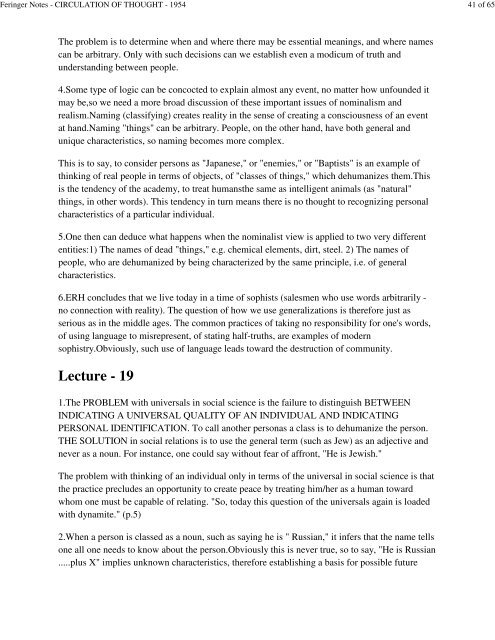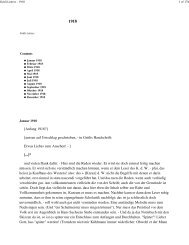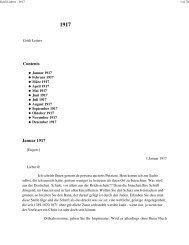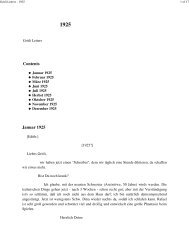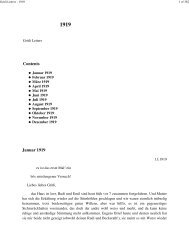Download pdf file - Eugen Rosenstock-Huessy
Download pdf file - Eugen Rosenstock-Huessy
Download pdf file - Eugen Rosenstock-Huessy
Create successful ePaper yourself
Turn your PDF publications into a flip-book with our unique Google optimized e-Paper software.
Feringer Notes - CIRCULATION OF THOUGHT - 1954 41 of 65<br />
The problem is to determine when and where there may be essential meanings, and where names<br />
can be arbitrary. Only with such decisions can we establish even a modicum of truth and<br />
understanding between people.<br />
4.Some type of logic can be concocted to explain almost any event, no matter how unfounded it<br />
may be,so we need a more broad discussion of these important issues of nominalism and<br />
realism.Naming (classifying) creates reality in the sense of creating a consciousness of an event<br />
at hand.Naming "things" can be arbitrary. People, on the other hand, have both general and<br />
unique characteristics, so naming becomes more complex.<br />
This is to say, to consider persons as "Japanese," or "enemies," or "Baptists" is an example of<br />
thinking of real people in terms of objects, of "classes of things," which dehumanizes them.This<br />
is the tendency of the academy, to treat humansthe same as intelligent animals (as "natural"<br />
things, in other words). This tendency in turn means there is no thought to recognizing personal<br />
characteristics of a particular individual.<br />
5.One then can deduce what happens when the nominalist view is applied to two very different<br />
entities:1) The names of dead "things," e.g. chemical elements, dirt, steel. 2) The names of<br />
people, who are dehumanized by being characterized by the same principle, i.e. of general<br />
characteristics.<br />
6.ERH concludes that we live today in a time of sophists (salesmen who use words arbitrarily -<br />
no connection with reality). The question of how we use generalizations is therefore just as<br />
serious as in the middle ages. The common practices of taking no responsibility for one's words,<br />
of using language to misrepresent, of stating half-truths, are examples of modern<br />
sophistry.Obviously, such use of language leads toward the destruction of community.<br />
Lecture - 19<br />
1.The PROBLEM with universals in social science is the failure to distinguish BETWEEN<br />
INDICATING A UNIVERSAL QUALITY OF AN INDIVIDUAL AND INDICATING<br />
PERSONAL IDENTIFICATION. To call another personas a class is to dehumanize the person.<br />
THE SOLUTION in social relations is to use the general term (such as Jew) as an adjective and<br />
never as a noun. For instance, one could say without fear of affront, "He is Jewish."<br />
The problem with thinking of an individual only in terms of the universal in social science is that<br />
the practice precludes an opportunity to create peace by treating him/her as a human toward<br />
whom one must be capable of relating. "So, today this question of the universals again is loaded<br />
with dynamite." (p.5)<br />
2.When a person is classed as a noun, such as saying he is " Russian," it infers that the name tells<br />
one all one needs to know about the person.Obviously this is never true, so to say, "He is Russian<br />
.....plus X" implies unknown characteristics, therefore establishing a basis for possible future


